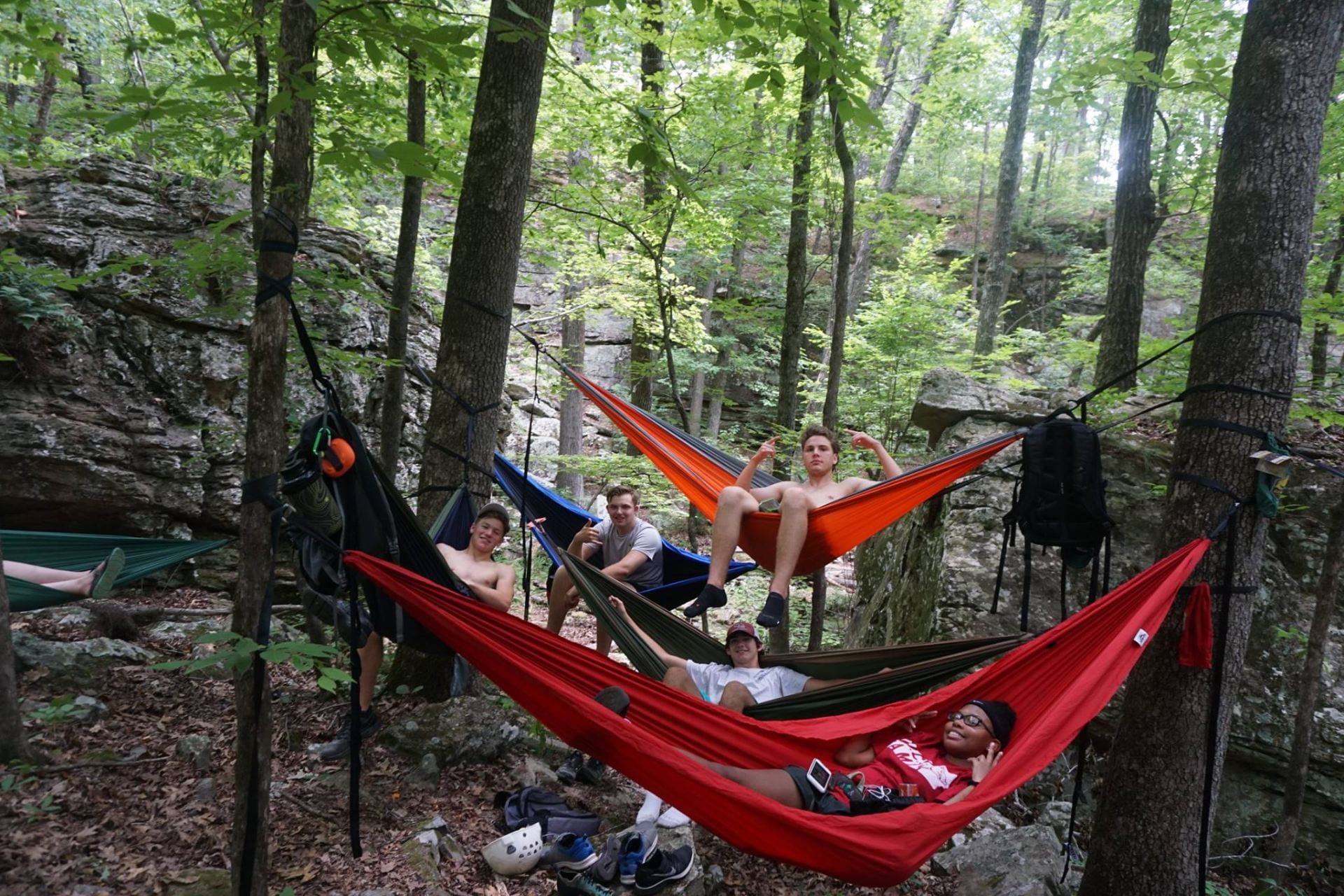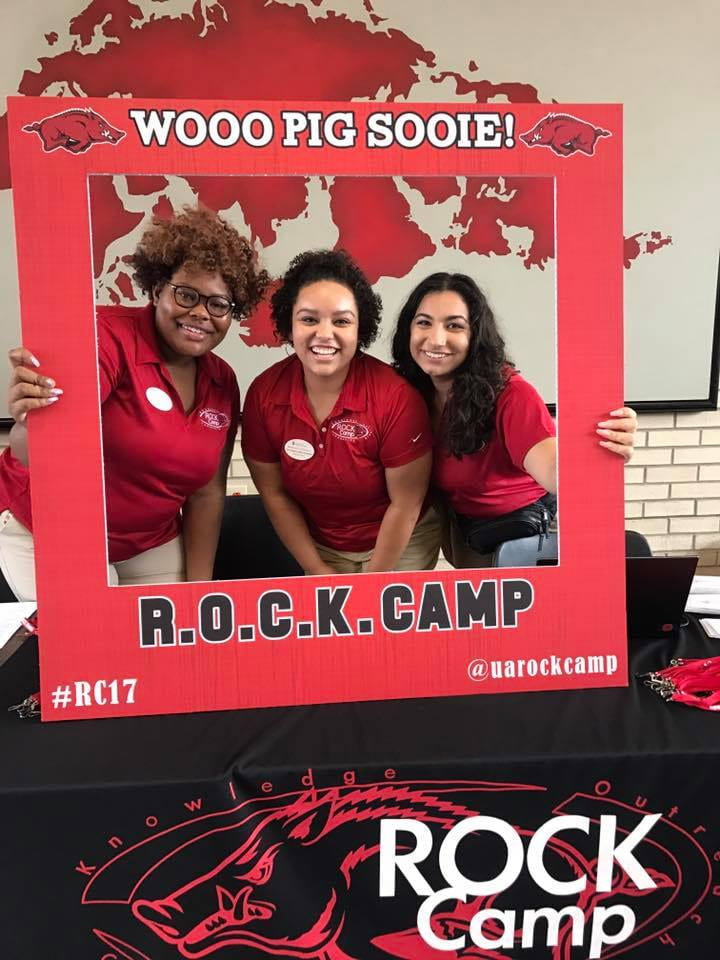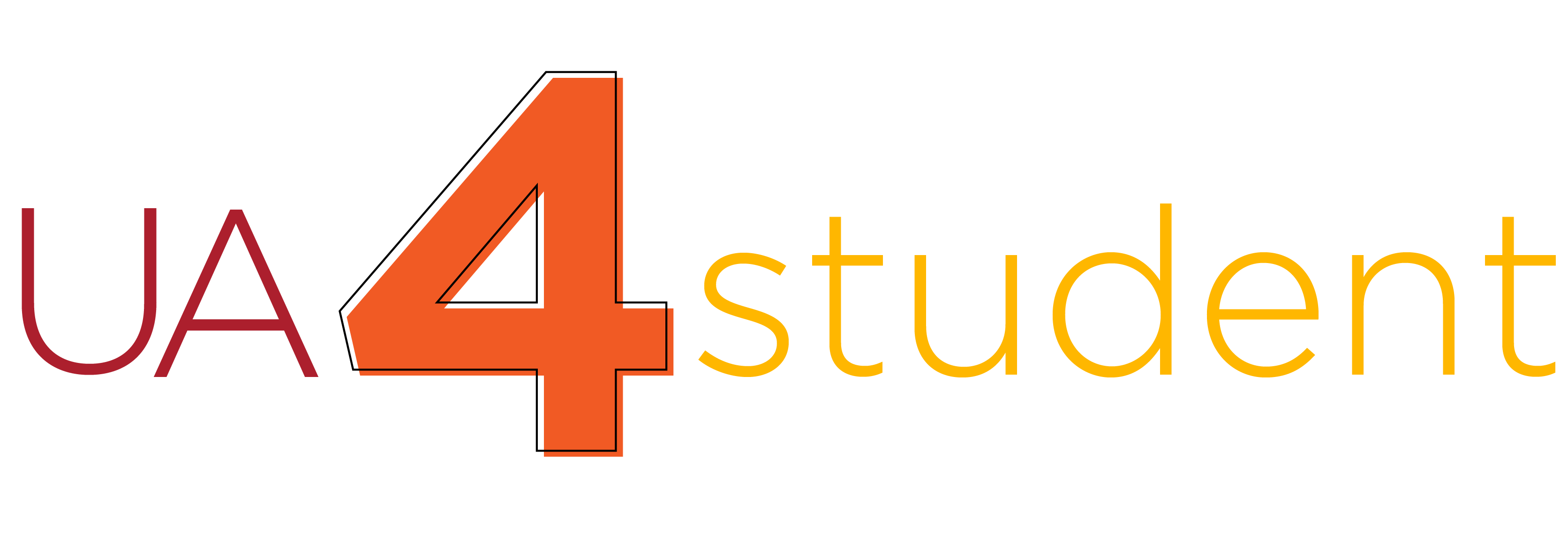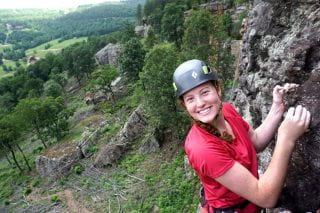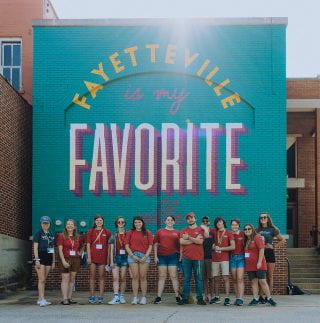
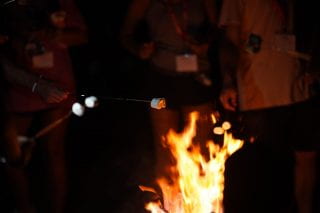 The sound of water crashing into your boat or the smell of a campfire slowly darkening marshmallows are normal camping experiences. Mix this with the feeling of camaraderie created from team-building exercises and friendly competition. Top it off with a dose of University of Arkansas history and traditions, and you could call it R.O.C.K. Camp.
The sound of water crashing into your boat or the smell of a campfire slowly darkening marshmallows are normal camping experiences. Mix this with the feeling of camaraderie created from team-building exercises and friendly competition. Top it off with a dose of University of Arkansas history and traditions, and you could call it R.O.C.K. Camp.
Razorback, Outreach, Community, and Knowledge are the cornerstones that created R.O.C.K. Camp two decades ago and still survive to this day. The program follows a classic extended orientation camp model, where new students come to campus before school starts and are led, by upper-class mentors, through activities that will prepare them to be successful college students.
Matt Meyers, assistant director for New Student Programs, explains how he got involved.
“I went to R.O.C.K. Camp as a reluctant incoming first-year student because my mother thought it’d be a good idea to help me meet people. Turns out she was right. I ended up becoming a mentor, and then a student coordinator for the program as an undergraduate, and then became the GA for the camp when I started my Master’s degree. Now I’ve been running the camp since 2017.”
The program has evolved and broadened its scope over the years. Reacting to a changing world seems to be what this program is good at.
“We’ve transitioned from simply a history-and-traditions based experience in August and have added on and experimented with variations of the camp program, which allow students to connect throughout the summer on the basis of common interests. These include programs like R.O.C.K. Camp Adventure (an outdoor recreation focused experience), R.O.C.K. Camp Service (a community outreach and service focused experience), and R.O.C.K. Camp Connect (an experience tailored for off-campus and bridge-scholar students). In 2018 and 2019 with the addition of A-Week as a large-scale initiative for new students, our traditional August camp experience was pared down to one week. Then when COVID-19 impacted our ability to host the camp in 2020, we took that time to re-evaluate how we could continue to provide the services and outreach of camp in a more targeted way,” Meyers explains.
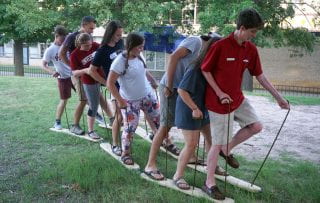 On any given day of camp you will find activities that promote collaboration and conversations between new students and their mentors. There will be activities introducing them to campus resources and how to use them. There will also be a lot of high-energy competitions and quite a few Hog Calls mixed in! All of these activities are designed for students to have fun while learning and connecting with others.
On any given day of camp you will find activities that promote collaboration and conversations between new students and their mentors. There will be activities introducing them to campus resources and how to use them. There will also be a lot of high-energy competitions and quite a few Hog Calls mixed in! All of these activities are designed for students to have fun while learning and connecting with others.
The student mentors are essential to the R.O.C.K. Camp experience. Alex Rhodenizer is a former R.O.C.K. Camp Adventure mentor.
“I started my R.O.C.K. Camp mentor experience in July 2019. One of my friends introduced me to Matt Meyers, and he got me involved in the camp! For two weeks, I was a mentor for R.O.C.K. Camp Adventure. Those were two of my favorite weeks from that summer! We had three back-to-back camps where we explored the northern Arkansas area via rock climbing, canoeing, hiking, cave exploring, etc. I was also a mentor for the regular version of R.O.C.K. Camp when August came around! I developed some of my closest relationships at R.O.C.K. Camp. We, the mentoring staff, enjoyed every aspect of the camp from training to the daytime activities to the bus ride back to campus. We seriously had the best time!”
“R.O.C.K. Camp is important to me because it is a fun way for students to meet new people, try new things, and get prepared for the next chapter in their life! With programs like R.O.C.K. Camp, it makes that next step in life a little less daunting.”
Lauren Stephens was a 2021 R.O.C.K. Camp Inspire mentor.
“I got involved with R.O.C.K. Camp my freshman year because I was an out-of-state student, so I was looking to make the college transition easier. At R.O.C.K. Camp, I learned how to navigate campus, so by the first day of school, I felt confident in knowing what my resources were and how to use them. I also made great friends that I’m still close with today. Because of the positive experience I had attending R.O.C.K. Camp, I was excited to come back as a mentor. R.O.C.K. Camp helped me become the student leader that I am today, so I wanted to give back and help new students become the best versions of themselves as a razorback,” Stephens said.
“R.O.C.K. Camp is important because college is big and scary. R.O.C.K. Camp alleviates the stress and struggle that many freshmen experience by teaching them the skills they need to not only survive but thrive. A student who attends R.O.C.K. Camp is a student who plans leaves their mark at the University of Arkansas.”
The 2021 format has created three new camps that are three days and two nights, and each camp collaborates with an academic partner: School of Art (R.O.C.K. Camp Inspire), Honors College (R.O.C.K. Camp Engage), and College of Engineering (R.O.C.K. Camp Foundations). Students participating in these programs have special opportunities to interact with the spaces and people in their college, giving them a unique opportunity to learn the ins and outs of what it takes to be a successful student in their chosen field or academic area. Additionally, we transitioned our R.O.C.K. Camp Adventure program from July to a multi-week experience starting in A-Week and concluding in October during the fall semester. Students have the option to sign up for either a land- or water-based camp experience working with UREC Outdoors.
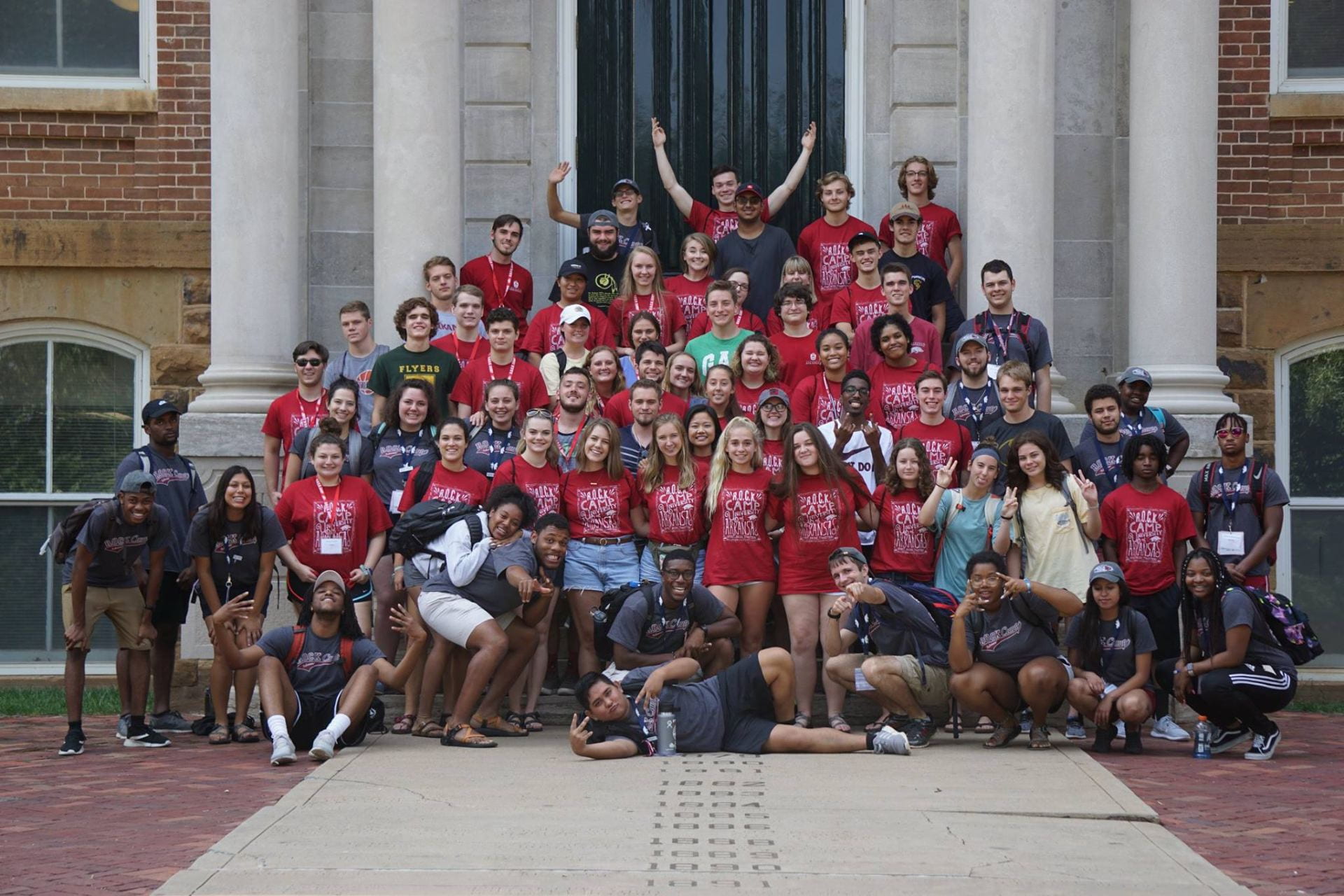
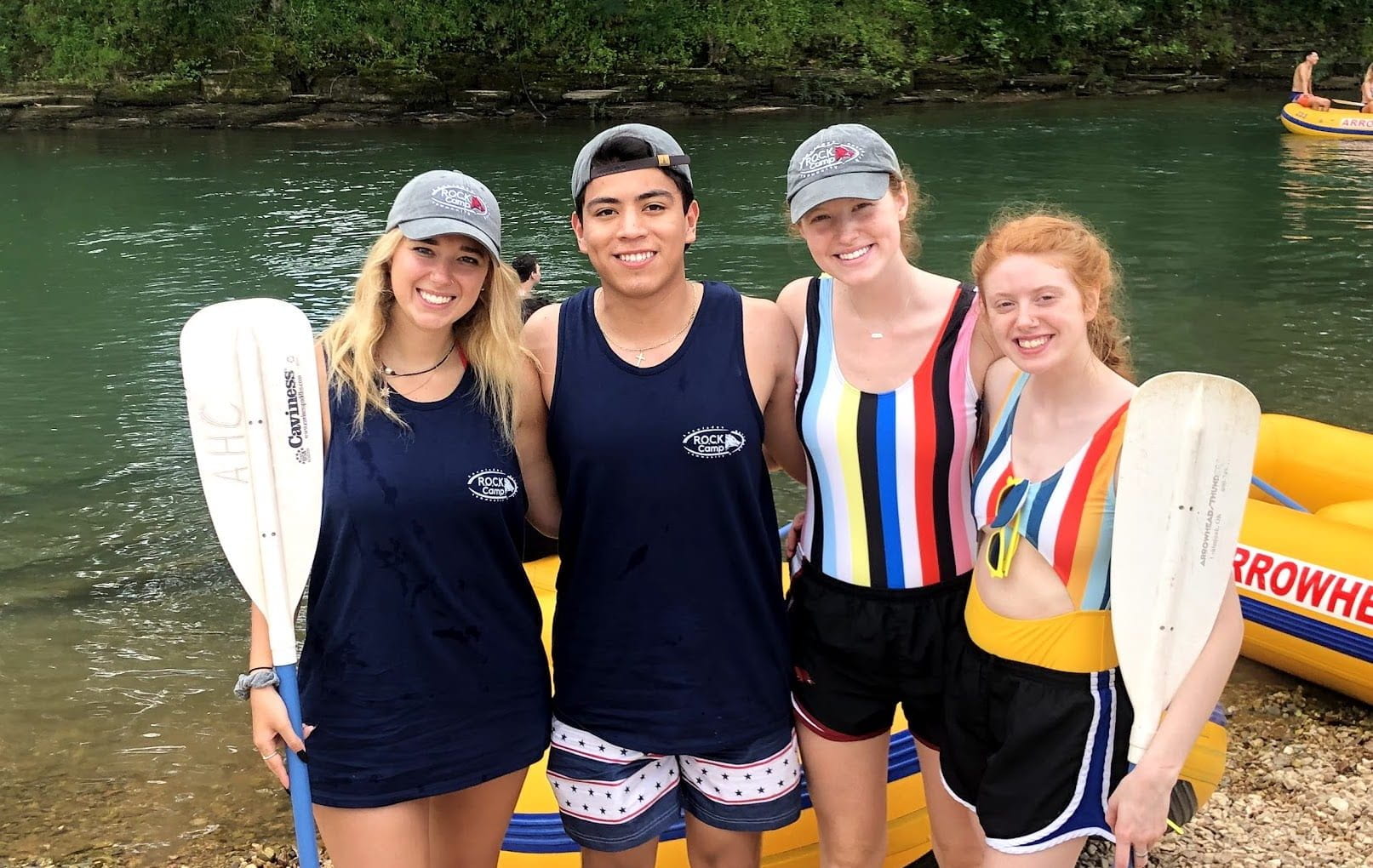
Donna Smith Jones was the connection from the School of Art for R.O.C.K. Camp Inspire.
“This was the first year the School of Art and ROCK Camp partnered on a summer experience for incoming first-year students to the UA. The specialized sessions were focused on incorporating several Art projects designed to break students out of their comfort zone, and learning strategies for creative thinking and decision-making, both great skillsets for a person’s first year at the UA,” said Jones, director of recruitment and outreach for the School of Art. “Most students had an interest or were planning to major in a creative field, including Art and Architecture, with others interested in Environmental Science, Biology, and more.”
“It was a joy to work with the great group of incoming students from around the state and region. The staff at NSFP are second to none and I believe the impact and connections the students made both personally and academically will help them navigate the beginning of their first year here quite well.”
For more information on R.O.C.K. Camp, contact Matt Meyers, Assistant Director for New Student Programs.
